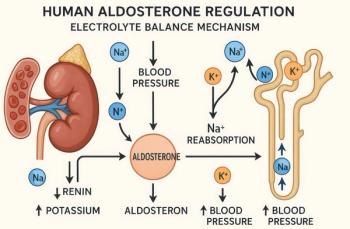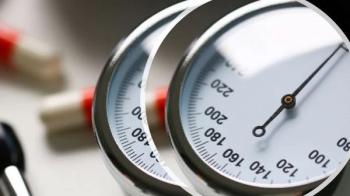
Reviewers Question First In-Class Rennin Inhibitor for Hypertension
NEW YORK -- Aliskiren, the first oral antihypertensive agent in the renin-inhibitor class, is no better at reducing blood pressure than older agents, and in some patients may actually increase blood pressure, claimed two reviewers.
NEW YORK, May 11 -- Aliskiren, the first oral antihypertensive agent in the renin-inhibitor class, is no better at reducing blood pressure than older agents, and in some patients may actually increase blood pressure, claimed two reviewers.
A review of studies involving more than 5,000 patients indicated that aliskiren (Tekturna, Rasilez) was no more effective than angiotensin-converting enzyme inhibitors or angiotensin receptor blockers, found Jean E. Sealey, D.Sc., and John H. Laragh, M.D., of Weill Cornell Medical College here.
"Aliskiren in combination with a diuretic appeared to lower blood pressure more than an aliskiren-angiotensin receptor blocker combination, but still failed to control blood pressure (< 140/90) in 50% of the patients," the reviewers wrote in the May issue of the American Journal of Hypertension.
Aliskiren suppresses from 90% to 95% of plasma renin activity, but it also causes significantly larger reactive rises in plasma renin concentrations than drugs in any other class of antihypertensive agents, an effect that cancels out its blood-pressure lowering effects, the authors asserted.
But a hypertension researcher who has used the agents in clinical trials said that many of the claims by Dr. Sealey and Dr. Laragh are not backed by the evidence at hand, nor are they supported by results of a large study scheduled for publication in the near future by another hypertension journal.
"The claim that renin inhibitors are equally effective as other blood pressure drugs is true," said Matthew R. Weir, M.D., professor of medicine and chief of nephrology at the University of Maryland Medical Center in Baltimore, in an interview.
"They are certainly as efficacious as any of the major hypertensive classes, no better, no worse," he said. "What that tells you is that high blood pressure is a multifaceted disease where there is no one answer. It's not just the renin system or the renin-angiotensin system, it could be the sympathetic nervous system, it could be sodium and water expansion, it could be blood vessel changes."
Dr. Laragh and Dr. Sealey reviewed the results of six clinical trials of aliskiren in more than 5,000 patients with mild-to-moderate hypertension, defined as diastolic pressures from 95 to 109 mm Hg.
Three of the trials were randomized, multicenter, double-blind, placebo-controlled, active-comparator studies of eight weeks in duration. In these trials, clinic blood pressures 24 hours after the last drug dose (trough pressures) were analyzed. Two of these trials also looked at aliskiren in combination with a diuretic.
Of the remaining trials, one had no comparator drugs, with blood pressure measured by 24-hour ambulatory blood pressure monitoring, one compared aliskiren to losartan (Cozaar), and one looked at the renin inhibitor in various combinations.
"The most striking and uniform finding in the multicenter trials was a large fall in blood pressure in the placebo groups, especially in diastolic pressure," Dr. Sealey and Dr. Laragh wrote. "After subtracting this placebo effect, the average baseline diastolic blood pressure of multicenter trial patients (147/93, 145/92, 143/90, and 147/94 in four different trials) was below the entry criterion. This may account in part for the relatively modest net effects of aliskiren on blood pressure."
To tease out the effect of aliskiren, the authors therefore subtracted the effect of placebo from total blood pressure decreases.
They found that taken as whole aliskiren monotherapy in doses of 150, 300 and 600 mg lowered trough blood pressure, but the 600-mg dose was no more effective than the 300-mg dose. For example, in one trial the trough change in systolic blood pressure was 10.5 mm Hg with a 300=mg dose versus 10.4 mm Hg for the 600-mg dose after accounting for placebo effect. In addition, the data indicated that "dose response to aliskiren is quite variable, and that aliskiren per se is not a more effective antihypertensive drug than an angiotensin receptor blocker or a diuretic," they wrote.
When they looked at aliskiren in various combinations, they found that aliskiren combined with either an ACE inhibitor, angiotensin receptor blocker, or diuretic generally lowered blood pressure more than it did in monotherapy.
"Although direct comparisons were not made, aliskiren appeared to be more efficacious in combination with a diuretic than with an ACE inhibitor or an angiotensin receptor blocker," the authors wrote. "But even with combination therapy, blood pressure rarely fell to < 140/90 in more than a third of the patients, and
They also found that when they looked at plasma renin concentrations, patients with the greatest reactive increases in plasma renin concentration saw little or no blood pressure-lowering benefit.
"Because aliskiren, like converting-enzyme inhibitors and angiotensin receptor blockers, only blocks 90% to 95% of plasma renin, the pressor consequences of its greater reactive increases in plasma renin concentration appear to offset its net ability to lower blood pressure, especially with higher doses."
Dr. Weir, however, questioned the authors' reliance on plasma renin concentrations as a measure of possible adverse effects.
"They're creating hypotheses about how drugs affect the renin-angiotensin system, and in particular they're referring to renin levels, which no one measures," he said. "People use plasma renin activity because the renin level is no nefariously difficult to interpret and utilize as a means of interpreting hormonal responses to blood pressure manipulation."
In their article, Dr. Sealey and Dr. Laragh said that patients with hyper-reactive renin systems, who might least benefit or even experience a blood pressure increase when exposed to a renin inhibitor (such as those with renovascular, advanced, or malignant hypertension), were excluded from all of the trials included in their analysis.
"It seems that until the possibility is eliminated of inducing adverse increases in blood pressure with aliskiren in certain individual patients, it would be safest and simplest to stick to the less expensive generic drugs that are widely available and broadly effective, especially when properly targeted for the salt-volume or the renin dependent patients, " Dr. Sealy and Dr. Laragh concluded.
Dr. Weir, however, noted that the concerns expressed by the authors did not arise during clinical trials submitted for FDA approval of aliskiren, and emphasized that aliskiren's blood-pressure lowering effects appear to be especially pronounced in combination with other agents.
"Quite uniquely, these drugs lower blood pressure quite well with another class of drugs that blocks the renin-angiotensin system, which are the angiotensin receptor blockers," he said. "In fact, the amount of blood pressure reduction they offer is on a par with a calcium blocker or a thiazide diuretic, which heretofore have been the most powerful ways to facilitate blood pressure reduction with a renin angiotensin system blocker.
Newsletter
Enhance your clinical practice with the Patient Care newsletter, offering the latest evidence-based guidelines, diagnostic insights, and treatment strategies for primary care physicians.



































































































































